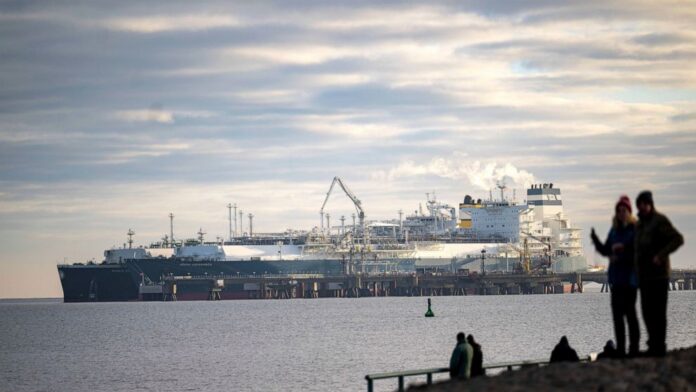DM Monitoring
BERLIN: The first regular shipment of liquefied natural gas from the Unit-ed States arrived in Germany on Tuesday, part of a wide-reaching effort to help the country replace energy supplies it previously received from Rus-sia.
The tanker vessel Maria Energy arrived at the North Sea port of Wil-helmshaven, where its shipment of LNG will be converted back into gas at a special floating terminal that was inaugurated last month by German Chancellor Olaf Scholz.
Germany has rushed to find a replacement for Russian gas sup-plies following Russia’s invasion of Ukraine. The facility in Wilhelmsha-ven is one of several such terminals being put in place to help avert an en-ergy supply shortage.
Germany has also temporarily reactivated old oil- and coal-fired power sta-tions and extended the life of its last three nuclear power plants until mid-April.
Environmental campaigners said they planned to protest the arrival of the Maria Energy, arguing Germany shouldn’t be importing fossil fuels, par-ticularly gas obtained through fracking.
Reserves in Germany’s gas storage facilities rose above 90% at the start of the year as unseasonably warm temperatures across much of central Eu-rope reduced heating demand.
“There was a good start to the season with a cold wave in mid-December which provided some white to pretty much everyone. Then, last week, there was quite a bit of rain and warm temperatures, so a certain number of runs had to close again,” Laurent Reynaud of the Domaines Skiables de France industry group that represents French ski resorts, lift operators and others, said on C-News television.
Germany too has seen unusually springlike temperatures — as high as 16 degrees Celsius (61 Fahrenheit) in parts of the country on Monday. New Year’s Eve is believed to have been the warmest since reliable records be-gan. The German Weather Service reported readings of 20 Celsius (68 Fahrenheit) and just above at four weather stations in southern Germany, news agency dpa reported.
Wim Thiery, a professor of climate science at the University of Brussels, said the same jet stream that pulled down cold air from the Arctic into the U.S. has fanned warm air from subtropical zones into Europe. He warned that climate change hasn’t finished its work — unless people cut use of fuels that trap heat in the atmosphere.




